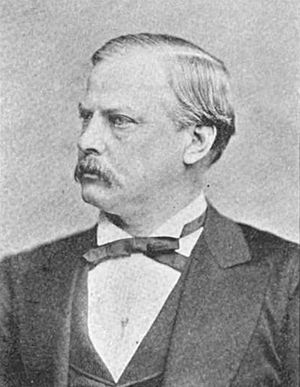Charles Erasmus Fenner facts for kids
Charles Erasmus Fenner (born February 14, 1834 – died October 24, 1911) was a lawyer from Louisiana. He served as a captain in the American Civil War. Later, he became a judge on the Louisiana Supreme Court, serving from 1880 to 1893. During his time as a judge, he wrote an important decision in the case of Plessy v. Ferguson. This decision said that "separate but equal" facilities for different races were allowed. The U.S. Supreme Court later upheld this ruling.
Contents
Early Life and Education
Charles Fenner was born in Jackson, Tennessee. He was the only son of Dr. Erasmus Fenner. After his mother died in 1841, his family moved to New Orleans in the early 1840s. His father became an editor for a medical journal.
Charles was taught by his father, who hoped he would become a doctor. He also went to school in New Orleans. Later, he attended the Western Military Institute in Kentucky. He graduated at age seventeen as the top student. He then studied at the University of Virginia for two years. In 1855, he graduated from the Law Department of the University of Louisiana. After finishing law school, he started his own law practice. He quickly gained many clients, especially in business law.
Military Service in the Civil War
In the 1860 election, Charles Fenner supported John C. Breckinridge. When Abraham Lincoln was elected and the Civil War began, Fenner joined the Confederate States Army. He started as a first lieutenant. He helped form a military group called the Louisiana Guards. He soon became a captain of one of their companies.
After New Orleans was captured by Union forces, Fenner formed his own military group. This group was called "Fenner's Louisiana Battery." They fought in important battles like Vicksburg, Atlanta, and Nashville. Fenner chose to remain a captain. He wanted to stay connected with the group that carried his name.
Political and Judicial Career
In 1866, Fenner was elected to the first Louisiana State Legislature. This was after the Civil War, during a time called Reconstruction. This was the only political office he ever held. He turned down all other requests to run for public office.
In 1877, he helped write resolutions for the people of New Orleans. This was during a disputed election for governor. Both candidates, Democrat Francis T. Nicholls and Republican Stephen B. Packard, claimed they won. The resolutions said that the people would not accept the Packard government. President Rutherford B. Hayes eventually agreed that Nicholls was the winner. Fenner also led a group that built a monument to Robert E. Lee.
In 1880, Governor Louis A. Wiltz appointed Fenner to the state supreme court. He was appointed for a four-year term. In 1884, he also became a professor of civil law at Tulane University. However, he had to resign from this teaching job. A law prevented him from holding that position while also serving on the Tulane Board of Administration. In 1884, Governor Samuel D. McEnery reappointed him to the court for a twelve-year term.
In November 1889, Jefferson Davis, who was the former president of the Confederate States, became ill. He was visiting Louisiana and was taken to Fenner's home in the Garden District. Davis stayed in Fenner's home for two weeks. He seemed to be getting better, but then his condition worsened in early December. According to Fenner, Davis lost consciousness on December 5. He passed away early on December 6, 1889. His wife, Varina, and several friends were with him.
The Plessy v. Ferguson Case
In 1892, Fenner wrote the decision for the Louisiana Supreme Court in the case of Plessy v. Ferguson. This case was about whether "separate but equal" facilities for white and non-white people were legal. The court decided that they were. Fenner's decision said that this did not go against the Fourteenth Amendment to the United States Constitution. He referred to earlier cases, including one from Massachusetts in 1849. That case had said that separate schools were constitutional. The Massachusetts court stated that prejudice "is not created by law, and probably cannot be changed by law."
After his second term on the court ended in 1894, Fenner returned to working as a private lawyer.
Other Leadership Roles
In 1892, Fenner became the president of the Tulane Board of Administrators. He was also the president of the Boston Club for twelve years. He was a member of the Board of Trustees for the Peabody Educational Fund. People knew him for being a great speaker.
Personal Life and Death
On October 6, 1866, Charles Fenner married Carrie B. Payne from New Orleans. They had three sons and one daughter. His oldest son, Charles P. Fenner, became a law professor at Tulane Law School. His second son, Erasmus D. Fenner, became a professor of orthopedic surgery at Tulane Medical School.
Charles Fenner died in New Orleans at the age of 78. He passed away after becoming ill with pneumonia.


